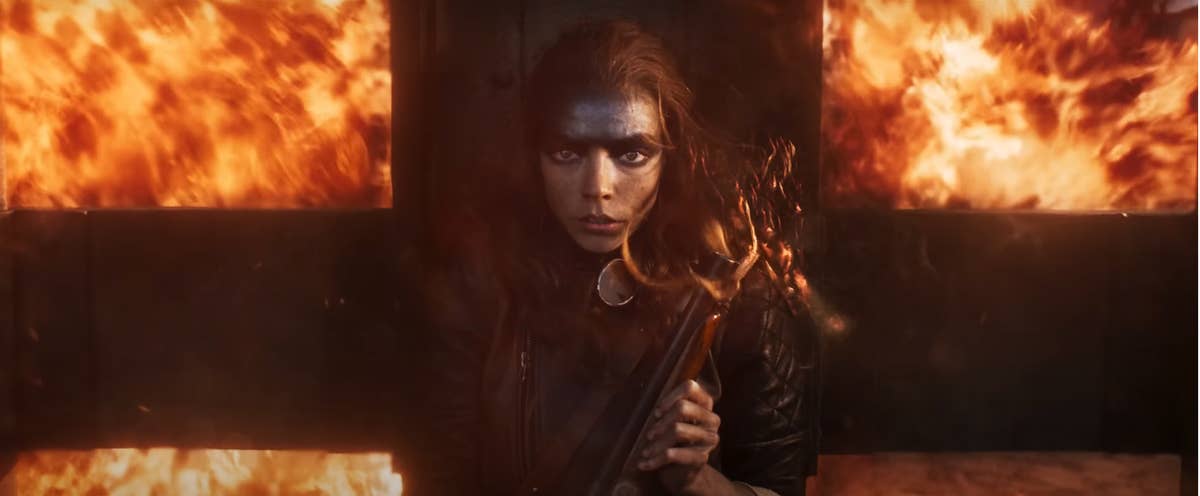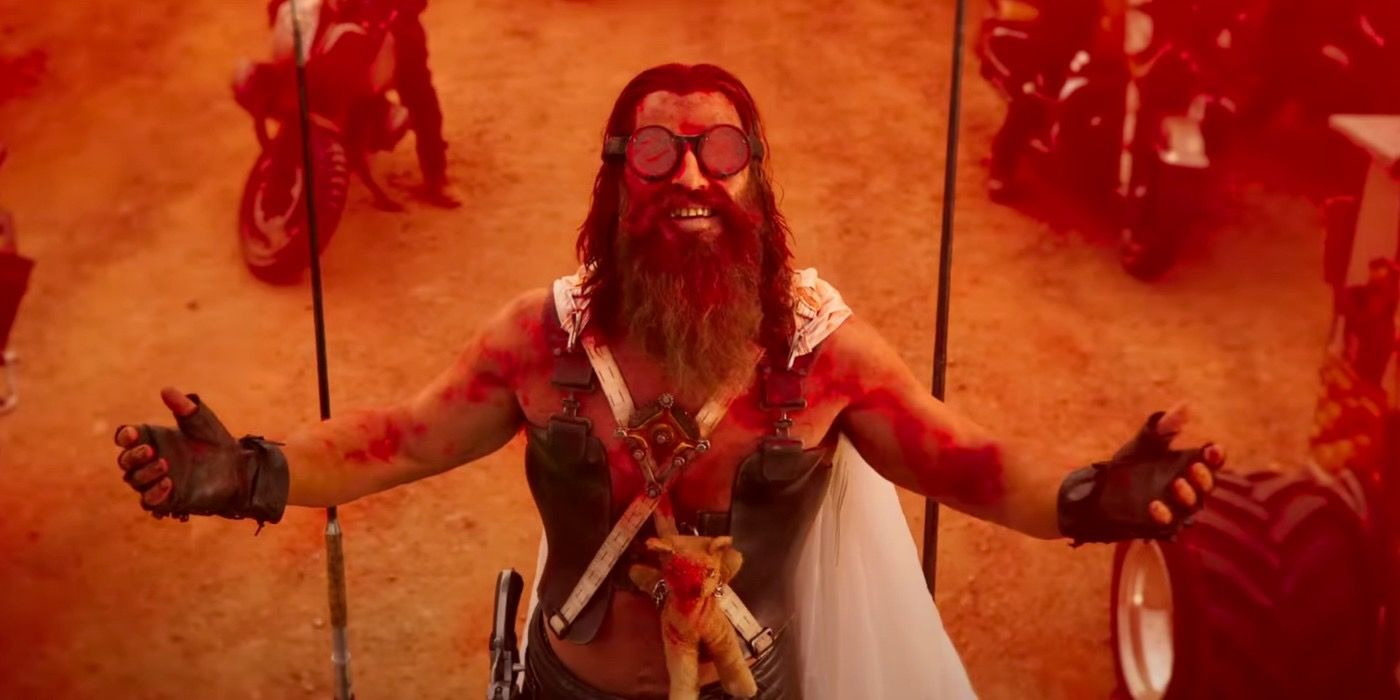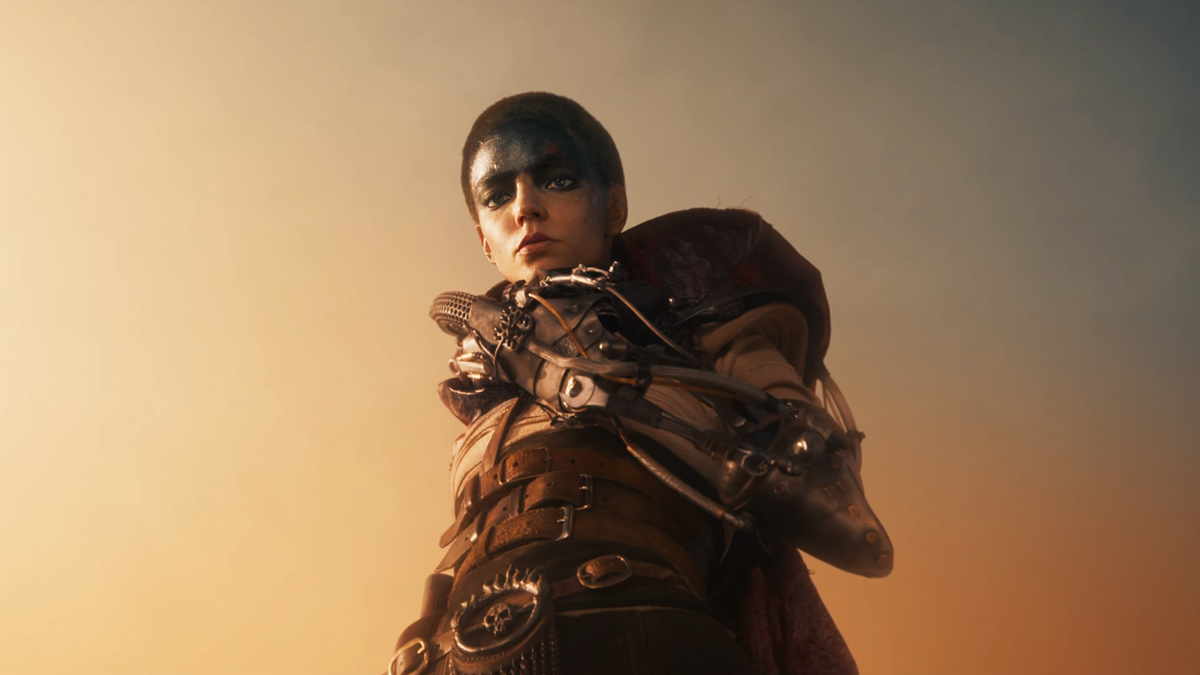The Gospel According to Dr. George Miller
Furiosa, the fifth film in the Mad Max series, opens not on Max or Furiosa but on a History Man. He is old and wizened, with a long beard and every inch of skin tattooed in writing, wearing clothing covered entirely with inscription. As he fades into the Wasteland night, his voice takes over, narrating the story.
The film might be about Furiosa but it is the History Man's recounting of events that we hear. As the film unfolds, especially as we reach the ending, one wonders whether the History Man takes seriously the work of history or whether the tales he tells are as embellished as some of the facts he recounts.
The film's movements and languidness bring to mind director George Miller's prior effort, Three Thousand Years of Longing, a film about storytelling itself and the perils and highs of losing oneself to story. Furiosa unfolds like a book, divided into five chapters, its telling precise and economical, a silent film that just so happens to have sound. It is a simmering pot of slow-cooked vengeance, revealed through a carnage of flesh, chrome and bullets upon an arid canvas, ultimately ending on a note poetic and knowingly anticlimactic.
"[George Miller] is my God, and the SAGA that he tells is my Bible."

In Christopher Vogler's Hero's Journey he outlines an archetypical story structure that most stories, especially sagas and quests follow. One of the crucial beats of his Journey is the refusal of the call, the hero has been asked to go on a quest but he must first vehemently refuse the calling. The story's inevitable plunging of the hero into this adventure, towards their destiny, is made all the more sweeter and immutable because of this initial refusal. Most good stories have this moment naturally woven into their fabric and the hero needn't be the one refusing the call, outside forces can keep the hero from the adventure.
In Furiosa, Furiosa has little say in her adventure. Kidnapped from a Green Place in the desert by marauders, young Furiosa finds herself a captive of the warlord Dementus. Her journey into the Wasteland is her adventure. A reprieve from such a harsh destiny comes in the form of her mother almost aiding her escape from Dementus. However, she is captured and tortured and Furiosa is returned to captivity. This moment runs concurrent to the refusal of call as outlined in Vogler's journey, which would make the rest of Furiosa her hero's journey. What does it say about a film that it's greatest moment of hope is also an aberration from the hopelessness of the rest of the story? What does it say about the Wasteland? What does it say about Furiosa?

"Where must we go... we who wander this Wasteland in search of our better selves?"
- The First History Man
The very first Mad Max is the concept at its most unformed, its sparse environs necessitated by the low budget lend an apocalyptic air to its Ozploitation revenge saga. The accident that became the setting for the Mad Max films was dialled up a notch in the subsequent film, Mad Max 2, also known as the Road Warrior. The setting is now the Wasteland, an apocalyptic water-parched Australia where civilisation has taken a hike and marauding gangs in inexplicable gas guzzling vehicles run free. Like the American West, the Wasteland is a mythic space, its dead soil fertile for myths and legend.
In the Wasteland, our titular hero, Max, assumes almost a sort of folk hero role. Mad Max 2 sees Max flitting into the midst of a conflict between a marauding gang and the residents of a more civilised settlement inside an oil refinery, it ends with the reveal that the story is being recounted, perhaps with as much accuracy as a story can be recounted, by a character in the film. Part 3, Beyond the Thunderdome, thrusts Max into a children's adventure, as he helps a band of abandoned children survive the Wasteland, in a story that is almost fable-like. In the fourth film, Fury Road, Max helps Furiosa rescue sex slaves of a despotic warlord. The films might bear his name but the story is never really about him and nor does his character undergo any significant change as the story progresses. Instead he functions as catalyst to these stories, driving the characters he meets through their quests. I theorise that Mad Max isn't even the same character across the films but an archetype. Maybe someone helps a bunch of characters in the Wasteland and leaves without a name, the story of such an event is swept down into the same stream as other such stories and becomes another legend about Max, the rare good man in the Wasteland.

The rest of the Wasteland? Bar a few desperate innocents, it is populated by marauding warlords and their henchmen. Violent unscrupulous despots like Immortan Joe and Dementus, played with élan by Chris Hemsworth in Furiosa, rule the sands. There is a patina of desperation that washes over the inhabitants of the Wasteland and, in Furiosa, we delve deeper into what it means to survive in it. Miller gives depth to even the tiniest players, the bikers who first kidnap Furiosa have many chances to leave her behind and survive her mother's deadly pursuit but the minor elevation in station they might get on delivering an unblemished child is worth the effort, worth outrunning death itself. A woman called Mr. Norton survives using her wits, left with a giant, memorable cleft in her upper lip. Dementus, himself, goes from young and boisterous to old and tired, and throughout the film is Furiosa's captor, father, mentor and vanquisher of hope. Hemsworth performs him as a character whose pathetic-ness is shrouded in layers of pageantry, whose pain, objectified in his dead children's teddy bear that is slung around his torso, is weaponised into cruelty. He is somewhat the Wasteland personified, cruelty in the face of tragedy, cruelty in the face of hope, pain subsumed by operatic excess.
Then there is Immortan Joe, warlord of the Citadel, who inspires in his warboys a suicide bomber's religious obeisance, who, at merest bidding are ready to throw their lives to a glorious end. His warboys personify blind, deadly religious belief, their function is to do their master's bidding and completing such bidding to a glorious end guarantees one a place in Valhalla, borrowing from Norse myth, where they will be "McFeasting" with other heroes.

Immortan's iron grip over the Citadel and his allies' reign over Gas Town and Bullet farm accord some stability and glimpses of a civilisation in the wild winds of the Wasteland. However, Dementus's chaotic ploy to capture Gas Town, through guile and a callous, blood-drenched plan where he sacrifices his own men, throws a wrench in the works of this order. They are forced to come to the table and deal with this outsider. It is here that Immortan's eyes fall on young Furiosa, still a prisoner to her fate.
Furiosa is offered in a deal to Immortan Joe and she finds herself captive amongst Immortan's wives, from where she escapes and hides herself as a boy mechanic amongst the workers in Immortan's Citadel. Here she runs into Praetorian Jack, while trying to escape in his war rig when they are attacked by marauders. Their chemistry develops between action beats, between each other's precise gunshots. Having lost his entire crew in the attack, Jack offers to mentor Furiosa, not out of kindness but a sort of pragmatism, he says that she has about her a "purposeful savagery." He takes her under his wing and they become equals and develop a relationship strong enough to pursue escape together. He mentions that his parents were soldiers looking for a "virtuous cause" and, in Furiosa's quest, in her hope, he believes he has found his. In his costume and makeup, Jack calls to mind Max and almost is a Max archetype in how he aids the protagonist in her quest. Unlike Max, he doesn't survive this story, killed viciously by Dementus for, more than anything, daring to hope. This destruction of hope by Dementus, by the Wasteland, solidifies her resolve and sets Furiosa on her final path of vengeance.

"You fabulous thing. You crawled out of a pitiless grave, deeper than hell. Only one thing that is going to do that for you. Not hope. Hate."
- Dementus
In the climactic showdown, Furiosa attempts to extract revenge from Dementus but finds no catharsis in beating a defeated man, what has been snatched from her can never be restored, there is no treading back on the path that's brought her here. Dementus revels in having transformed Furiosa into a creature of hate and cruelty, another catalyst of the Wasteland's ruthless design.
Here's where the History Man's voice takes over as we leave any notion of objectivity and return to a plane of dream and metaphor. Instead of killing him, Furiosa plants a seed from the Green Place inside him, letting the roots of the tree entwine around him, imprisoning him. In the film's final moments, Furiosa plucks the first fruit from this tree and offers it to Immortan's imprisoned wives before leading them to freedom, a story told in the fourth Mad Max film, Fury Road.
The plucking of the fruit is a transmutation of vengeance. Furiosa, like Max, yearns for a return to the time before everything in their universes went to ruin but can never attain that. A virtuous cause presents itself, worthy of Furiosa's abilities tempered by years of pain in the Wasteland. All people like Furiosa, Max or Jack can do is wait for a "virtuous cause" and hope it gives them the catharsis of redemption.
Furiosa is less a film about its titular character and more of an exploration about what it means to survive the Wasteland. It colors in its smallest characters with sharp, succinct hues. Good or evil is tossed out the window. In the Wasteland, all everyone is trying to do is survive.
The ultimate thesis of the tapestry Miller is weaving in his Mad Max films seems to be that for good men and women, there is only the Wasteland, where there is only survival, and sometimes, from its dead soil, a worthy cause may flower.

- Tarkas
Great writing, really gets into the heart of how George Miller's Ozploitation evolved into something bigger than just being a local Aussie legend.
ReplyDeleteI usually consider Road Warrior as George Miller's Yojimbo/Fistful of Dollars, but that's just probably me. :v